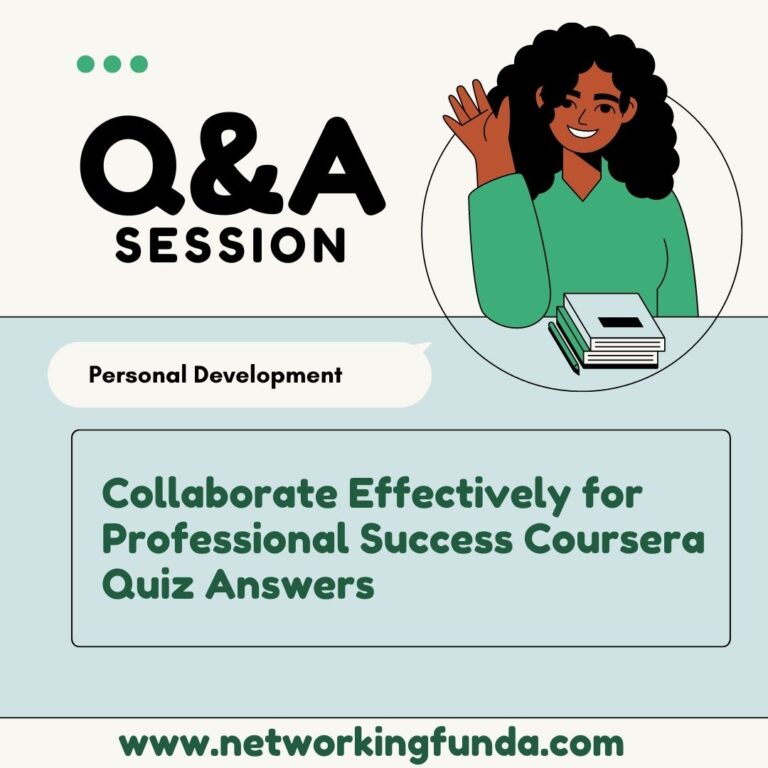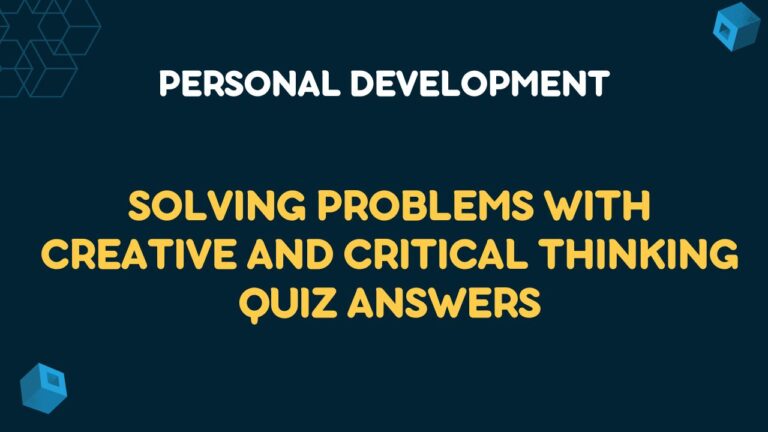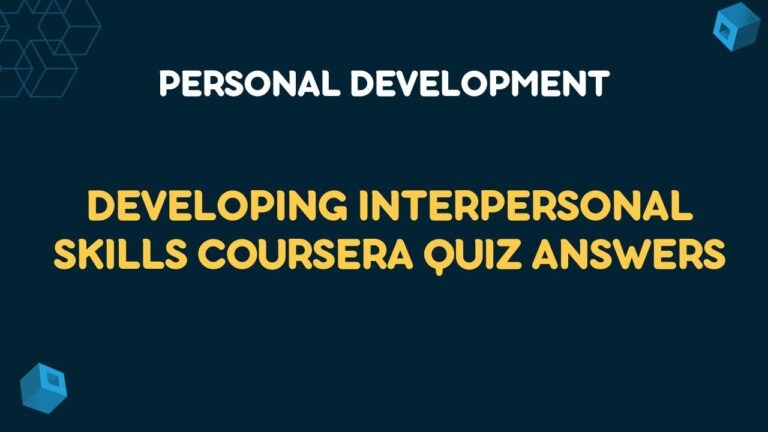Table of Contents
The Science of Well-Being Week 02 Quiz Answers
Q1. This week, Professor Santos showed visual illusions to make a point about how humans think. The illusion below, the Ponzo Illusion, was left out. If you’re like most people you will see the line on the right as long, even though the two red lines are the same length (Go ahead and measure them if you don’t believe it). The illusion works because the distance cues provided by black lines trick our brains into thinking that the right line is “further away” and should be bigger.

Which of the following statements align with what Professor Santos covered in the lecture? (Check all that apply)
- Our minds strongest intuitions are often wrong
- Our minds always deliver accurate information to us
- Knowing is half the battle
- Knowing is not half the battle
Q2. Considering the studies shown in the lecture, which of the options below closely aligns with the comparison of PREDICTED emotions to ACTUAL emotions after receiving bad news like getting a bad grade or getting turned down for a job offer.
- 😐 Neutral (Predicted), 😐 Neutral (Actual)
- 😐 Neutral (Predicted), 😭 Super Sad (Actual)
- 😭 Super Sad (Predicted), 😭 Super Sad (Actual)
- 😭 Super Sad (Predicted), 😐 Neutral (Actual)
Q3. True or False. After a certain point, people are content with their salary and do not aspire to make more money.
- True
- False
Q4. According to Sonja Lyubomirsky, what is the percentage breakdown of the factors that determine our general happiness?
- 50% Genetic Setpoint, 50% Life Circumstances
- 40% Genetic Setpoint, 60% Life Circumstances
- 50% Genetic Setpoint, 10% Life Circumstances, and 40% Our Intentional Actions and Thoughts
- 50% Genetic Setpoint, 40% Life Circumstances, and 10% Our Intentional Actions and Thoughts
5. True or False. The past several decades of economic development have made the inhabitants of the US much better off and have consequently led to a drastic improvement in life satisfaction over the years.
- True
- False
Q6. Did you do your requirements this week? (Don’t worry, there is no wrong answer.)1 point
- Yes
- No
The Science of Well-Being Week 03 Quiz Answers
Q1. When you do a google search for “[Social Media Platform] makes me feel” you get AutoFill searches like this:
Which of the following Annoying Features of our mind best fits these patterns?
- Annoying Feature #1 – our minds’ strongest intuitions are often totally wrong
- Annoying Feature #2 – our minds don’t think in terms of absolutes; our minds judge to relative reference points
- Annoying Feature #3 – our minds are built to get used to stuff
- Annoying Feature #4 – we don’t realize that our minds are built to get used to stuff
Q2. Many people chase things like high salaries, perfect bodies, extreme weight loss, cosmetic surgery, and luxury items because they are convinced that attaining these things will make them happy. Which of the following Annoying Features fits best?
- Annoying Feature #1 – our minds’ strongest intuitions are often totally wrong
- Annoying Feature #2 – our minds don’t think in terms of absolutes; our minds judge to relative reference points
- Annoying Feature #3 – our minds are built to get used to stuff
- Annoying Feature #4 – we don’t realize that our minds are built to get used to stuff
Q3. In a study where teens forecasted their happiness level if they failed a driver’s exam, teens continued to mispredict their emotions even if they had failed their driver’s test a few times before. Which of the following Annoying Features fits best?
- Annoying Feature #1 – our minds’ strongest intuitions are often totally wrong
- Annoying Feature #2 – our minds don’t think in terms of absolutes; our minds judge to relative reference points
- Annoying Feature #3 – our minds are built to get used to stuff
- Annoying Feature #4 – we don’t realize that our minds are built to get used to stuff
Q4. Lottery winners are not significantly happier than those in a control group a year after winning the lottery. Which of the following Annoying Features fits best?
- Annoying Feature #1 – our minds’ strongest intuitions are often totally wrong
- Annoying Feature #2 – our minds don’t think in terms of absolutes; our minds judge to relative reference points
- Annoying Feature #3 – our minds are built to get used to stuff
- Annoying Feature #4 – we don’t realize that our minds are built to get used to stuff
Q5. On average, people would rather make less if their peers earned less than being paid more if their peers make more. Which of the following Annoying Features fits best?
- Annoying Feature #1 – our minds’ strongest intuitions are often totally wrong
- Annoying Feature #2 – our minds don’t think in terms of absolutes; our minds judge to relative reference points
- Annoying Feature #3 – our minds are built to get used to stuff
- Annoying Feature #4 – we don’t realize that our minds are built to get used to stuff
Q6. According to one study, higher levels of TV viewing lead to a higher estimate of others’ wealth and a lower estimate of personal wealth. Which of the following Annoying Features fits best?
- Annoying Feature #1 – our minds’ strongest intuitions are often totally wrong
- Annoying Feature #2 – our minds don’t think in terms of absolutes; our minds judge to relative reference points
- Annoying Feature #3 – our minds are built to get used to stuff
- Annoying Feature #4 – we don’t realize that our minds are built to get used to stuff
Q7. Did you do your requirements this week? (Don’t worry, there is no wrong answer.)
- Yes
- No
The Science of Well-Being Week 04 Quiz Answers
Q1. In a now-famous episode of the television show “Parks and Recreation,” the characters Tom and Donna explain how they spend one day of the year “treating themselves.” According to them, it’s the best day of the year (you can watch the clip here ). The GIFs below show Donna explaining different things she buys to treat herself on “Treat Yo’Self Day.”
Based on what you learned this week, which TWO of these items would allow Donna to treat herself in a way that thwarts hedonic adaptation.
- Clothes
- Massages
- Mimosas ( a beverage )
- Fine Leather Goods
Q2. Which of the activities below enhance savoring which is the act of stepping outside of an experience to review and appreciate it? (Check two options that apply)
- Being fully absorbed in the moment
- Brainstorming ways the experience could be better
- Considering how to share the experience with others later
- Telling yourself you don’t deserve this good experience
Q3. Which of the activities below helps thwart your hedonic adaptation?
- Thinking about how you met your significant other
- Thinking about how you might not have met your significant other
- Thinking about how much time you have left of [college]
- Thinking about how little time you have left of [college]
- A & C
- B & D
Q4. Completing a gratitude visit where you write a letter thanking someone who has not been properly thanked and delivering the letter to that person can have positive effects on subjective well-being for which range of time?
- Up to 1 day
- Up to 1 week
- Up to 1 month
- There is no positive effect of a gratitude visit on well-being
Q5. True or False. People tend to enjoy watching a continuous television program more than watching a disrupted program broken up by commercials.
- True
- False
Q6. Did you do your requirements this week? (Don’t worry, there is no wrong answer.)
- Yes
- No
The Science of Well-Being Week 05 Quiz Answers
Q1. Which of the following statements aligns more with a growth mindset rather than a fixed mindset? (Check all that apply)
- “No, I’m practically perfect in every way”
- “I’ll work harder than ever before”
- “Why bother?”
- “We can better ourselves”
- “Good, I’m learning”
Q2. Which of the following are features of flow (a mental state in which a person performing an activity is fully immersed in a feeling of energized focus, full involvement, and enjoyment)? (Check all that apply)
- Your goals are challenging but attainable
- You consider the activity intrinsically rewarding
- You lose track of time passing
- You lack awareness of physical needs
Q3. People with strong social ties are: (Check all that apply)
- less vulnerable to premature death
- more likely to cope better with serious illnesses
- less likely to fall prey to stressful events
- more likely to experience envy
Q4. True or False. Sharing an experience with another person, even if it’s a stranger and even without communicating, amplifies one’s experience.
- True
- False
Q5. True or False. Valuing time over money is associated with increased happiness.
- True
- False
Q6. You saw this week that money actually can buy happiness if spent the right way. Based on what you learned in the lecture, which of the two options below are more effective on average? (Check two options)
- Spending money on awesome stuff
- Spending money on experiences
- Spending money on yourself
- Spending money on others
Q7. Meditation is associated with the following benefits: (Check all that apply)
- Increased grey matter in the brain
- Increased positive emotions
- Higher test scores
- Increased social closeness and implicit likeness
Q8. In one study, those suffering from major depression had the highest rate of recovery in which of the conditions below:
- Exercise
- Medicine (antidepressants)
- Exercise + Medicine
- Results inconclusive
Q9. Did you do your requirements this week? (Don’t worry, there is no wrong answer.)
- Yes
- No
The Science of Well-Being Week 06 Quiz Answers
Q1. Considering what you learned about situation support, what kitchen counter may be a better environment to help someone who is trying to manage their weight?
- Kitchen counter with several snacks like cookies and chips
- Kitchen counter with fresh fruit
Q2. Considering what you learned about situation support, what may be a better situation for someone who would like to develop a meditation routine.
- Putting a post it reminder on bulletin board in the house
- Putting a reminder in your phone to ping you right before
Q3. Considering what you learned about situation support, what may be a better situation for someone who is trying to make a habit of going to the gym.
- Packing a gym bag the night before
- Packing a gym bag right before
Q4. Considering what you learned about situation support, what may be a better situation for someone who has been putting off planning an event.
- Planning the event alone
- Planning the event with friends
Q5. _________ and ___________ when combined are scientifically-associated with better goal setting. (Check two concepts below)
- Mental contrasting (a visualization technique involving first thinking of a positive future outcome followed by thinking of obstacles)
- Implementation intention (a self-regulatory strategy in the form of an “if-then plan” that can lead to better goal attainment)
- Practicality (an assessment framework in which you determine how practical and important attaining a goal will be in your life)
- Achievability (a forecast of how realistic and feasible achieving the goal will be)
Q6. The WOOP technique helped women stick to their fitness goals and lead to an increase in the amount of physical activity for what range of time?
- Up to 10 days
- Up to 10 weeks
- Up to 10 months
- No change
Q7. Did you enjoy your Time Affluence this week?
- Yes
- No
More related Quiz Answers >>
Course 01: Foundations: Data, Data, Everywhere
Course 02: Ask Questions to Make Data-Driven Decisions
Course 03: Prepare Data for Exploration
Course 04: Process Data from Dirty to Clean
Course 05: Analyze Data to Answer Questions



